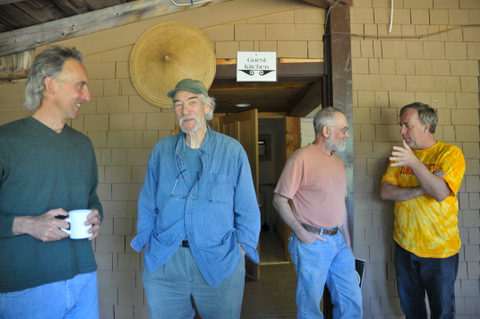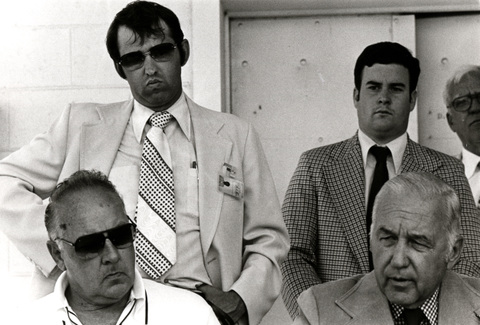Guy Chichester remembered – pictures
February 11th, 2009


February 11th, 2009


February 11th, 2009

A special Guy
February 11th, 2009

Guy Chichester remembered
February 11th, 2009
Published on Tuesday, February 10, 2009 by the Concord Monitor (New Hampshire)
Guy Chichester, Clamshell Alliance Co-Founder, 1935-2009
Chichester, activist force, dies at age 73
by Daniel Barrick
When Guy Chichester and three friends were arrested at the New Boston Air Force Station in 2003, the officer on duty had little experience processing political protesters. The person who normally handled bookings was gone for the day, and the officer didn’t want the four non-violent activists spending the night in jail.
![[Guy Chichester, anti-nuclear leader, died Sunday at his home in Rye, New Hampshire. (Deb Cram file photo)]](https://web.archive.org/web/20110725175551im_/http://www.commondreams.org/files/article_images/chichester.jpg)
Guy Chichester, anti-nuclear leader, died Sunday at his home in Rye, New Hampshire. (Deb Cram file photo)
So Chichester did what he often did. He stepped forward and spoke up, this time to explain the booking process to the officer. Having been arrested at least a dozen times by that point, Chichester figured he should put his knowledge to good use. ”The officer was so puzzled, but Guy just walked him through the process, suggested what he might want to do,” recalled Lynn Rudmin Chong, a longtime friend of Chichester who was arrested with him on two occasions.Chichester, who died at the age of 73 on Sunday, was one of New Hampshire’s most experienced and well-respected activists. He proudly noted that he had been arrested in every New England state and the Pentagon. But arrest records barely hint at the impact Chichester had on the environmental movement in New Hampshire and across the nation.He was a founding member of the Clamshell Alliance, a group that led protests against Seabrook Station nuclear power plant in the 1970s and that helped awaken a broader environmental movement. He helped establish the national Green Party. And, through his charisma and his conviction, he inspired countless people to mobilize for environmental and political reform themselves. A carpenter by trade, Chichester was a rabble-rouser by vocation.”You could call him one of the elders of the movement,” said Arnie Alpert, program coordinator for the American Friends Service Committee and an early member of the Clamshell Alliance. “He had such a presence and an ability to articulate, not just the grievances we had against nuclear power, but the values of the no-nukes movement and the growing environmental movement and the importance of ’small d’ democracy.”Veterans of the Clamshell Alliance recall Chichester as a critical force in the movement: an articulate, impassioned and tireless organizer. The alliance’s stated mission was to use nonviolent civil disobedience and grassroots organizing to block the construction of a nuclear plant that Public Service of New Hampshire had proposed for a saltmarsh in Seabrook. Chichester, as much as anyone else, helped take that fight to the public and, over time, shape public opinion against the construction of new nuclear plants. Even former opponents in that battle said he was enormously effective in both goals.”He was a big gruff guy, but it came right through that he really believed what he was advocating for,” said Nick Ashooh, who was spokesman for PSNH in the late 1970s. “Guy demonstrated the impact that one person could have if he stands up for his beliefs.”Renny Cushing, a close friend of Chichester since the 1970s, said Chichester helped connect local residents who were concerned about their own health and property with out-of-state activists who saw the Seabrook fight as part of a larger movement.Chichester didn’t have to go far to find his way to environmental activism.He and his family lived in Rye, and, a few years before the Seabrook fight, he helped rally opposition to a plan by Aristotle Onassis to build an oil refinery on the Great Bay in Durham.He was born and raised on Long Island, N.Y., but the suburbanization of the island drove him to look elsewhere to make a home. He moved with his wife and family to Rye in 1970, inspired by childhood memories of summers spent with an uncle on the Maine coast. Chichester didn’t waste much time getting involved in politics. He was a local organizer for George McGovern’s 1972 presidential campaign. But it was with the Clamshell Alliance that he found his true passion: environmental activism.Chichester hosted many of the alliance’s early meetings in his home. Standing more than 6 feet tall, he was a commanding presence at town hall meetings and other forums where alliance members offered their arguments to the public. And he helped shape the group’s ethos of nonviolent resistance.Though the Seabrook power plant was eventually built, PSNH scrapped a planned second reactor at the site. And several acts of protest at Seabrook, including one massive demonstration that resulted in nearly 1,500 arrests, helped turn public opinion against nuclear power. Then-Gov. Mel Thomson, an outspoken supporter of the Seabrook plant, was defeated for re-election in 1978, in large part because of voter outrage over the rising cost of construction.Friends say Chichester’s influence extends far beyond the protests at Seabrook.”He was a visionary,” said Paul Gunter, a co-founder of the Clamshell Alliance who now works for the Maryland-based Beyond Nuclear. “Guy really saw that we could put more people to work through environmental and conservation measures. He was saying that in 1976, and it’s still being debated today in this economic stimulus bill.”Roy Morrison, a friend of Chichester for more than 30 years, said Chichester was able to bring a broader perspective to the environmental movement’s earliest days.”He saw that the issue wasn’t just Seabrook or nuclear power but the defense of the living world and that that affected so many aspects of society,” Morrison said. “He saw that we needed a broad political expression to change things.”That realization led Chichester further afield in the years after Seabrook. He helped found the national Green Party, and in 1990, he was the party’s nominee for New Hampshire governor. In recent years, Chichester protested logging operations in the White Mountain National Forest, the Iraq war and the dominance of the two-party political system. He was arrested in 2005, along with 13 other protesters, for staging a sit-in at the office of Sen. Judd Gregg. The protesters wanted to speak with Gregg about his support for the Iraq war.One of Chichester’s most infamous acts of protest came in 1990 when he cut down an emergency siren pole near the Seabrook power plant. According to Morrison, Chichester blocked off Route 1A with a couple of saw horses, used a rented chain saw to fell the tower and calmly waited for the police to come arrest him. After being released from the police station, Morrison said, Chichester invited his friends to his house for some homemade clam chowder.Chichester was charged with criminal mischief for felling the siren tower. The first trial resulted in a hung jury. Chichester was acquitted at the second trial. Morrison recalled jury members approaching Chichester in the courthouse parking lot afterward, asking him how they could get involved in the anti-nuclear movement.”He wasn’t a great orator, but he was a truth teller,” Morrison said. “No matter where he went, people could see that.”Chichester is survived by his wife of 51 years, Madeline, five children and eight grandchildren.
________________________________
Guy B. ChichesterRYE — Guy B. Chichester, 73, died Feb. 8, 2009, at his home surrounded by family and friends.He was born Feb. 11, 1935, in Freeport, L.I., N.Y., to Arthur B. and Elizabeth (Blake) Chichester.He was a U.S. Navy veteran of the Korean War.A carpenter by trade, he made his home in Rye since 1970.A longtime political and social activist, he was a founding member of the Clamshell Alliance and over the years was consistently involved in working for social change, donating his energies to a wide variety of civic and community organizations, most recently as president of the Seacoast Anti Pollution League.He shared 51 years of marriage with his wife, Madeline L. (Meyer) Chichester.Other family members include five children, Blake Chichester, Dru Chichester, Ben Chichester, Jennifer Chichester, and Noelle Chichester; a sister, Eileen Beck; eight grandchildren; two step-grandchildren; and many cousins, nieces and nephews.SERVICES: The family will receive relatives and close friends Sunday from noon to 5 p.m. at the home of Jane Holway, 647 Washington Road, Rye. A memorial service will be held in the spring.Memorial donations may be made to New Hampshire Peace Action, 4 Park St., Suite 210, Concord 03301.
© 2009 Concord Monitor
To The Village Square… › Create New Post — WordPress
May 10th, 2008
SPECIAL PRESENTATION FROM ANNA GYORGY – World touring activist and author.
| Saturday July 26, 10 AM |
Protecting Biodiversity and Life. Anna Gyorgy provides a look at how
countering corporate industrialized monoculture and genetically modified
agriculture involves issues similar to those of countering nuclear power.
Anna Gyorgy, Network coordinator of Women & Life on Earth (www.wloe.org) a
non profit association to help connect women internationally, share
information and work for ecological health and peace with justice. Anna was
an author/activist in the safe energy/anti-nuclear movement 1975-1982. Since
1985 she has lived in Ireland, Germany, South Korea and West Africa, and
written, edited and organized with special interest in ecology and
international connections. Anna currently lives in Bonn, where she
coordinates Women & Life on Earth (www.wloe.org) a German
non-profit association helping to connect women internationally, share
information and work for ecological health and peace with justice. Recently she helped
organize Planet Diversity, an international conference on food and
agriculture, and much more, held in Bonn May parallel to negotiations for
the UN Convention on Biological Diversity and its related Protocol on Biosafety
| Friday – Sunday July 25 – July 29 |

No Nukes ! Enjoy meeting old friends and raise hell among the young ones.where ? – A camp with a social conscience… where global justice meets nature– A retreat center for progressives to relax in the company of people who share concerns and values– “It’s one of those places where you can learn things you didn’t know you were looking for.” -a friend– A truly unique vacation destination. Affordable. Beautiful. Invigorating. M. Thompson, Innkeeper ?
To The Village Square… the exhibit !
April 30th, 2008


An exhibit of photographs documenting the birth and growth of the movement that stopped -for thirty one years- the development of nuclear power in the US.
A look at the people who, against all odds, made a difference.
15 . 22 X 29 Black & White archival pigment prints.
May 16th – June 1 2008– RECEPTION May 16th 5 PM to 8PM
OVER THE RAINBOW GALLERY@ THE INSTITUTE FOR LIVING ETHICS – Corner of Broadway & Hudson, NYACK NY 10968.“……..So although the organization and events featured here–the Clamshell Alliance and its brave blockade of the Seabrook Nuke–are now past factors in the anti-nuclear movement, this collection of text and photographs is no mere exercise in nostalgia. The Seabrook action, the organizing and decision-making that preceded and followed, basically energized an opposition that swelled in localities and then legislatures around the country to stop the creation of new nuclear power plants in the United States. That embargo is now under challenge. And it is the spirit of the Clamshell that must be reawakened if we are to resist the intent of the industry….” Lionel Delevingne, Nyack May 2008 To the Village Square…we must carry the facts of atomic energy, from there must come America’s voice.
Albert Einstein. June1946
FREE POSTERS – FACTS OF NUCLEAR POWER
March 31st, 2008

Antinuclear renaissance call to cooperation
A renaissance in nuclear power will require an anti-nuclear renaissance
– this time everything must be reexamined
Dear Antinuclear Friends,
This is an invitation to national cooperation and coordination in the antinuclear battle. If you wish to receive more information please respond.
I would be willing to coordinate a 50-state national movement until we can get organized. I would do this primarily through a simple free website and to coordinate a new idea called NACCTT – national antinuclear citizen’s council and think tank. Instead of a more conventional think tank populated by elites, it would integrate the Internet, a citizen council made up of elder and younger activists, and think tank processes, that would hopefully lead to a profound new level of cooperative processes for collective critical thinking and networking, absolutely necessary for the new antinuclear renaissance. If you wish to be involved please respond.
My study has revealed a glaring fact that we must come to terms with, that the previous movement could not garner enough cooperation amongst themselves to knock out this evil once and for all. The movement was strong but almost totally anarchistic in nature, so the effects were always too diluted to overcome those men in power without conscience. I’ve concluded that any antinuclear movement cannot do the complete job without a consolidated national foundation – national energy and coordination feeding local efforts and vice versa.
First, we need to take an overall existential assessment of our historical and current reality. Second, an honest self-examination must be done totally irrespective of who we perceive our opponents to be. We must look in the mirror with a willingness to see the flaws that might sabotage our own efforts. Third, we must muster enough cooperation to get the job done. Freezing the expansion of nuclear power, which was certainly a good thing, while also experiencing a surge in U.S. and world nuclear weapons numbers when Reagan came on may not have been a desirable trade-off (though unintended, of course). This is an example of the kinds of honest re-evaluations we must make. The new movement must be all about national cooperation and coordination, and going back to the basics with a new pair of eyes.
The strength of a cooperative democracy is directly proportional to
the strength of its cooperative dialog.
Be well, Mark Hanawalt – Boise, Idaho, usa communitytruth@yahoo.com
Paul Gunter Wins Prestigious Jane Bagley Lehman Award
January 26th, 2008
For Immediate Release: January 25, 2008
Contact: Linda Gunter, 301.455.5655

Gunter, walking tall… on track …. 1976
Takoma Park, MD – Paul Gunter of Beyond Nuclear, whose service to the cause of anti-nuclear activism spans three decades, has been named a recipient of the prestigious Jane Bagley Lehman (JBL) Award. Ms. Bagley Lehman was a founder of the Tides Foundation which will present the award in March.
Gunter joins fellow award winners – physicist Dr. Arjun Makhijani, president of the Institute for Energy and Environmental Research, and Georgia activist, Glenn Carroll of Nuclear Watch South.
The JBL awards seek to recognize individuals who have exhibited a deep commitment to the public interest and whose work demonstrates innovative approaches to social change. The 2007 awards specifically sought individuals whose anti-nuclear work reaches wide audiences and successfully bridges the gap between grassroots activists and decision-makers.
“It’s an honor to be recognized and I truly appreciate the support I received from my fellow activists, all of whom deserve to share this award,” Gunter said. “I especially appreciate the decision of the Tides Foundation to recognize the importance of this issue today. We face a tsunami of well-funded propaganda from the nuclear power industry, all of it misleading and counter-productive to addressing climate change. The Tides Foundation has done enormous service in shining a spotlight not only on the contribution of three individuals but on all the incredible work that this movement, collectively, has contributed over the decades.”
Gunter began his anti-nuclear activism in the 1970s as co-founder of the country’s first opposition movement to nuclear power – the Clamshell Alliance – which fought construction of the Seabrook reactor in New Hampshire. Since then he has developed expertise as a meticulous watchdog over the Nuclear Regulatory Commission, exposing the agency’s persistent prioritizing of industry profit margins over public safety.
Jane Bagley Lehman co-founded the Tides Foundation in 1976 and was the Chair of the Board until her death in 1988.
